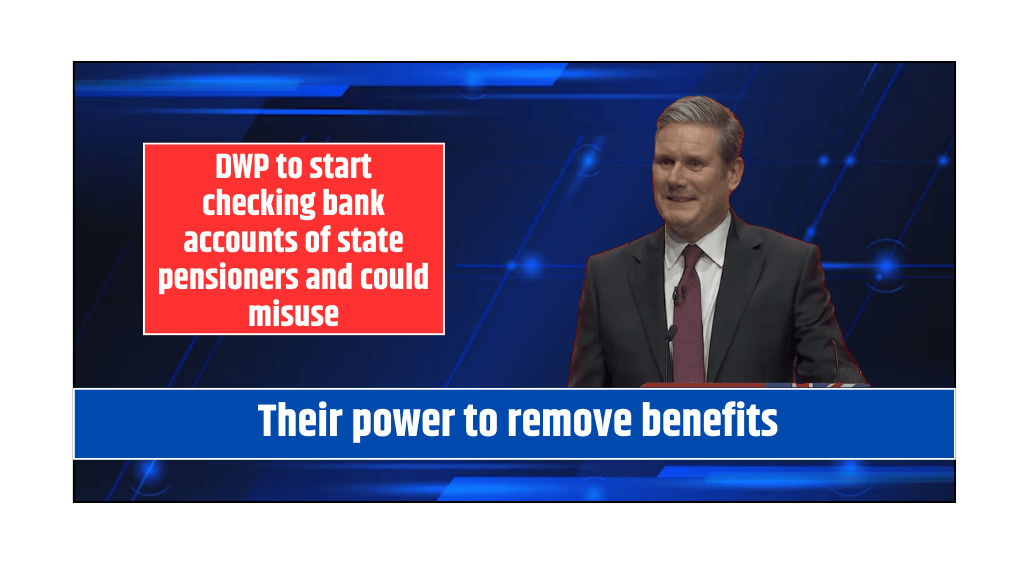The Department for Work and Pensions (DWP) will soon begin checking the bank accounts of low-income state pensioners as part of a new effort to stop benefit overpayments. The move is part of a wider plan to tighten rules around Universal Credit, Pension Credit, and Employment and Support Allowance.
While the aim is to cut fraud and error, the new system is already drawing criticism from privacy and disability campaigners.
Let’s look at who this affects, how it will work, and what pensioners need to know.
What Is the DWP Doing?
The DWP is introducing a new data-matching system that allows them to review bank account data of people claiming means-tested benefits. It’s mainly targeting:
- Universal Credit
- Pension Credit
- Employment and Support Allowance (ESA)
If DWP finds anything suspicious in one benefit claim, they might check the person’s other benefits, such as Housing Benefit, for eligibility too.
However, the State Pension is not included in this plan, and cannot be added later, even through new regulations.
Updated Pension Credit Rates from April 2025
From April 7, Pension Credit payments have increased:
- Single Pensioners:
£227.10 per week (was £218.15) - Couples:
£346.60 per week (was £332.95)
On average, Pension Credit is now worth £4,300 a year to eligible pensioners.
Since last summer, over 50,000 new awards have been made — a 64% increase compared to the same period the previous year.
How Long Does It Take to Get Pension Credit?
According to DWP, nearly 78% of Pension Credit claims are processed within 50 working days — from application to decision. So, if you apply this month, you could receive your first payment by mid-June.
What Are the Privacy Concerns?
Under current rules, the DWP can only request bank transaction data if they have reasonable grounds to suspect fraud.
But the new system allows wider use of algorithms to search large numbers of accounts. Campaigners are raising alarm bells:
Disability Rights UK said:
“This removes our right to privacy and increases chances of false positives.”
Big Brother Watch warned:
“This could lead to expansive surveillance and unfair targeting of vulnerable people.”
The DWP has said that human oversight will still be central to avoid errors and misuse.
Also, the legislation says DWP will not see how you spend your money. Banks will only share limited financial data, and may be penalised for oversharing.
What the DWP Says
The department explained that the aim is to:
- Prevent overpayments
- Catch fraud early
- Avoid unnecessary debts for claimants
DWP will also use the new system in a “test and learn” approach, reviewing its effectiveness and fairness before full rollout.
The DWP’s upcoming bank account checks are aimed at reducing fraud in means-tested benefits, including Pension Credit and Universal Credit. While the move is designed to ensure public money is spent correctly, it also raises serious questions about privacy and the treatment of vulnerable people.
If you’re receiving benefits and believe you’re eligible, you have nothing to worry about. However, it’s always good to stay informed, understand your rights, and seek help if you’re unsure.
FAQ’s
Will DWP have full access to my bank account?
No. The DWP will not see your transactions or how you spend your money. Banks will only share limited data to check eligibility.
Does this affect State Pension payments?
No. The DWP’s new powers do not apply to the State Pension, and this cannot be changed even by future regulations.
Which benefits will DWP check under this new system?
The checks will begin with Universal Credit, Pension Credit, and Employment and Support Allowance. More benefits may be added with Parliament’s approval.
When will the new system begin?
The new eligibility checks and bank data sharing measures are expected to begin gradually from 2026, using a ‘test and learn’ approach.
How much is Pension Credit in April 2025?
From April 7, 2025, single pensioners get £227.10 per week and couples receive £346.60 per week under the Pension Credit scheme.






